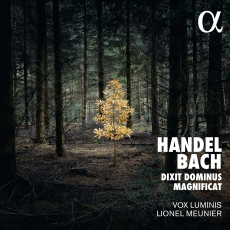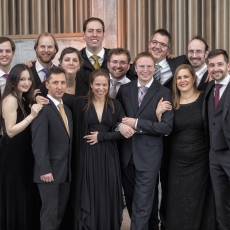Vox Luminis - Bach: Magnificat - Handel: Dixit Dominus - Early Music Review
This performance couples two five-voice – but otherwise very different – baroque favourites on Vox Luminis’ latest CD. Handel’s Dixit Dominus was recorded in Begijnhofkerk, Belgium in January 2017 and the Bach Magnificat in the Waalse Kerk, Amsterdam in July.
Dixit Dominus dates from 1707, and is performed here with ten singers (two to a part) and five-part strings (3.3.2.2.2.1) with organ at the then Roman pitch of A=392. The photograph of the recording shows the arc of singers facing the strings, with the cellos in the centre in front of the organ and contrabass, and the upper strings to each side. In the Magnificat, they use the substantial Christian Müller organ in Waalse Kerk in Amsterdam, but there is no photograph to show how the forces are deployed. In their live performance in St John’s Smith Square last December, the organist was hidden behind the centrally placed organ, and the two groups of SSATB singers radiated outwards on a single plinth from the basses in the middle with the flutes and oboes in the centre of the orchestra, surrounded by the 3.3.2.2.1 strings. The trumpets were placed to the treble side of the organ and the timpani to the bass. Even when miked for a recording, how the singers and players stand in relation to each other is clearly important in this attentive and well-rehearsed ensemble, where the only directing is done by Lionel Meunier raising his (full) score as he breathes. If you listen carefully, you can hear the corporate breath taken just before the start of track 12 of the Bach Magnificat, the Gloria Patri. Even live, the balance seemed fine, and in St John’s the Bach was complemented by two earlier Magnificats – Pachelbel and Kuhnau.
In this kind of music-making, everyone takes responsibility not just for their own line, but for the ensemble; so singers and players alike breathe as one. The blend and balance are astonishingly good, and even when the whole ensemble is engaged, every stroke from the leader’s bow or beat from the timpani is alert to this corporate breath. The singers betray no anxiety about being heard among so many instruments, so there are no nasty pushes on notes tied over to the next bar or wobbles from those voices who suspect that they may not be heard, that disfigure so many performances. The singers’ prime task is to deliver the text and articulate it, while the instruments fill out the tone and underline the changes in mood and colour – even the Müller organ, one of whose Principal ranks we hear so effectively in Quia fecit in the Magnificat.
For an illustration of balance, listen to how the strings and organ let the singer breathe in Et exultavit in the Magnificat without any sense of artificiality or hold-up in the rhythm, and then note the contrast between Stefanie True in Et exultavit and the matchless but quite different Zsuzsi Toth in Quia respexit which leads without a break into the five-part omnes generationes, the subject of the sentence coming at the end in the Latin for emphasis: ecce enim ex hoc beatam me dicent omnes generationes. In this performance we have no sudden change in the marked tempo Adagio as we are used to, with omnes generationes going off at a gallop, divorced from the rest of the sentence as if it were a different number. Perhaps it will surprise you as it did me, but the more I listen to it, the more sense it makes. There are no other surprises, and the singers when performing alone or in duets or trios sing within their comfort zone so there are no overt histrionics from attention-seeking would-be stars.
This balanced elegance is true of the Handel as well, where vocal agility and the ability to blend with your fellow singers is a sine qua non. The vocal sound is sharp and incisive and a perfect complement to the five-part strings. The two sopranos in De torrente in via and the lead into the Gloria Patri are stunning if you want to take a brief snapshot of why this CD is so splendid. As well as enjoying Vox Luminis’ wonderful sound, I learn something each time I listen to them. I thoroughly recommend this disc.

